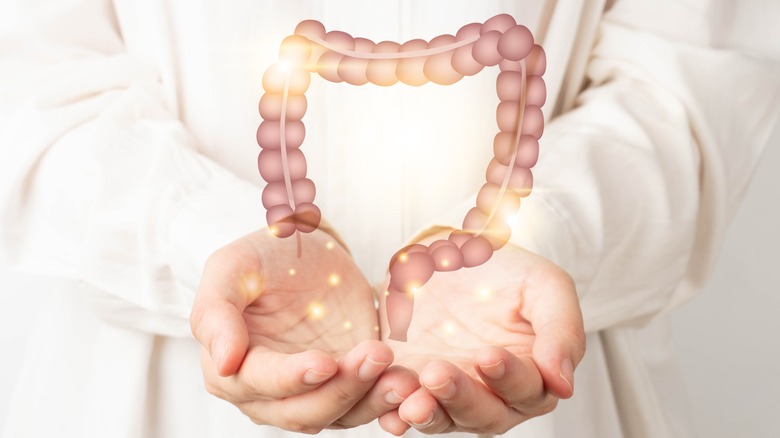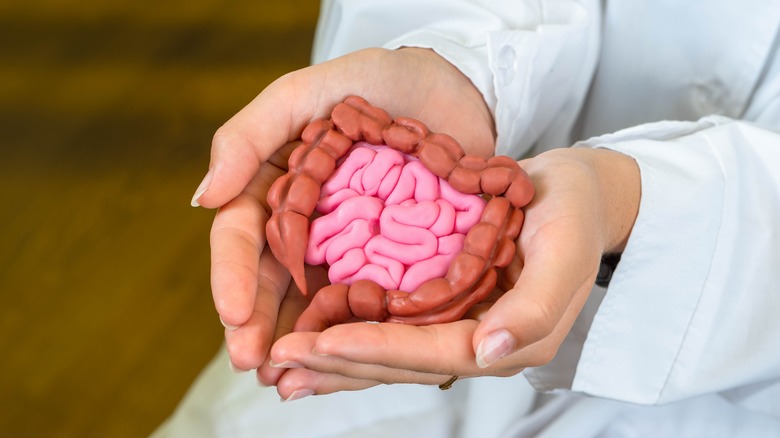What You Can Do Today To Improve Your Gut Health, According To A Health Expert
If you're looking for a few ways to help improve your gut health, look no further. Although you may not realize it, your gastrointestinal system actually plays an important role in your overall health. In fact, millions of dollars in funding are invested into gut health research every year in order to help fund studies that seek to uncover more information about the inner workings of the gut microbiome.
The gut microbiome, or microbiota, refers to the bacteria and microorganisms living in your gut, which are involved in some of your body's most basic functions. As a result, this bacterial ecosystem can have a significant impact on your health and well-being and can even communicate with the neurons in your brain. In an exclusive interview with Health Digest, Dr. Kelly Halderman, a health expert in clinical nutrition, functional medicine, and the chief health officer at Weo, explains why your gut microbiome is so important to your overall health and shares some tips on what you can to do improve your gut health. Keep in mind, the signs of an impaired gut can vary based on the area affected and if any disruption to the microbiome has occurred, according to Halderman. Indicators include constipation, diarrhea, bloating, gas and heartburn. "Those can also be signs of an impaired microbiome, so typically testing is recommended with a licensed health care professional to differentiate," explains Halderman.
Why gut health is important
Improving your gut health can help lower your risk of disease and chronic illness, especially when it comes to heart disease, diabetes, autoimmune disorders, inflammatory bowel disorders, and even depression, which are all influenced by the gut microbiome, according to Halderman. In addition, your gut health can also play an important role in helping to rid your body of any toxins.
"Aside from the function of the microbiome, the health of the gut is also tied to detoxification — the process where toxins and other unneeded nutrients are eliminated from our body," Halderman says. That's because your gastrointestinal tract uses bile to move toxic by-products from the liver and carry them through your intestines before they are excreted as waste and released into the toilet. "When our gut is not able to function properly, we are at risk of accumulating toxins and other waste that our body no longer needs," Halderman shares.
Factors that can impair your gut health
When your gut microbiome is impaired, it can become unbalanced and stop functioning properly. This is known as dysbiosis — a condition characterized by a disruption in the gut microbiome involving the loss of beneficial microorganisms and bacteria in the gastrointestinal tract. But what exactly can harm and impair your gut health?
As it turns out, this imbalance can be caused by a number of different diet, lifestyle, and environmental factors, the most common of which include "consuming a poor diet, high amounts of stress, exposure to various environmental pollutants and toxins, dehydration, overuse of antibiotics, and some over-the-counter drugs, smoking cigarettes, and/or vaping," Halderman says. In addition, not getting enough sleep, drinking too much alcohol, not eating a diverse range of foods, a lack of prebiotics in your diet, and not getting regular physical activity can all harm the trillions of bacteria in your gut microbiome and impair your overall gut health (via Healthline).
Quick and simple ways to improve your gut health
Fortunately, there are a few things you can do to help improve your gut health. "A simple and quick way to start to improve gut health is to consume enough water, especially electrolyzed water," Halderman shares. Since the human body is made up of 60% water, we literally cannot survive without it. When we become dehydrated, the cells that line our gut can't function properly. In fact, several studies have shown that the gut microbiome is negatively affected when we don't consume enough water and electrolytes. That's why drinking more mineral water can help improve your gut health.
"Another way to improve gut health is to consume a healthy diet that includes fiber," Halderman says. "Fiber increases the weight and size of your stool and softens it." Some foods that are high in fiber also tend to contain quite a bit of water, as well. Furthermore, adding more foods to your diet that are high in probiotics, like kombucha, kimchi, and tempeh, can help fill your gut microbiome with good bacteria and boost your gut health.
The physical improvements of boosting your gut health
Improving your gut health can have many positive results, according to Halderman. However, drinking more water and adding probiotics and high-fiber foods to your diet can affect everyone differently and lead to results that are unique to each individual, depending on various aspects of their health. "Overall, because the function and health of our gut is foundational and intertwined with many biological functions, improvement can be diverse and profound," Halderman explains.
Generally speaking, however, boosting your overall gut health can result in immediate physical improvements. That's because your gut health is closely tied to your overall physical health. For instance, taking good care of your gut microbiome can help increase your energy levels, improve your sleep, reduce gastrointestinal issues, enhance the quality of your skin, and potentially promote weight loss (via Prime). "Gut health is essential because the gut is the foundation for whole body health," Halderman says.
To learn more about Dr. Kelly Halderman, visit her Facebook and Instagram or go to we-o.org or we-o.com.





